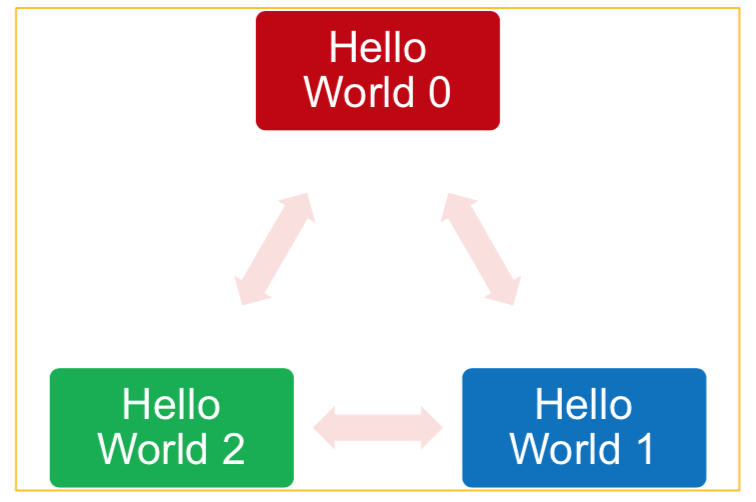MPI standard
Overview
Teaching: 25 min
Exercises: 5 minQuestions
Why was MPI developed?
How can I use MPI?
What is the basic code required?
Objectives
Understand why MPI is important
Understand how MPI can be coded
Use the key MPI functions to write a basic example
A brief history
The idea of message passing evolved in the 1980s where supercomputers were dominated by Cray. Due to dependency on Cray and competition was difficult this required new approaches to supercomputing. Message passing was born out of a desire to link competing technologies. Cray realised that many cheaper commodity processors could be linked together cheaper than fewer expensive vector processors. To make sure code was portable between systems, assurances were made to make this possible hence MPI was formed.
MPI forum was formed in 1992 with its first standard in 1994, available in C and Fortran. The easiest approach was to decompose data for processors to work on the same problem (but different views). This works within processors on a node and across a network and is Limited only by Amdahl’s Law.
MPI standard is large, but the good news is that many programs only use a small subset. There are many sophisticated functions available. The design of MPI makes no assumptions on underlying hardware so work with homogenous and heterogeneuos systems, that is to say it is hardware vendor neutral.
ECMWF weather and climate model IFS
A well respected weather and climate model called IFS, developed by the European Centre for Medium-range Weather Forecasting, ECMWF, only required approximately 10 MPI calls.
Preliminary information
The examples are written in Python using the mpi4py module. This should be easily translated into other languages. The web can be used for information.
Data models
- SPMD - Single Program Multiple Data is usually the recommended approach.
- One program executes mutliple times.
- Problem divided using the same executable code.
- MPMD - Multiple Program Multiple Data can be trickier to master.
- Different executables used to communicate
- Useful to couple different models that would contain completely different approaches such as ocean and atmosphere modelling.
- Available in MPI version 2.0
Definitions
- Task
- One running instance of program
- Basic unit of MPI parallel code
- Leader
- The first task in the set of parallel tasks
- Given id of zero
- Follower
- All other tasks in the program.
- No real difference other than usually leader can interact easily with system, such as I/O.
Hello World!
The following command executes a 3 MPI tasks.
$ mpirun -np 3 echo "hello_world"
hello_world
hello_world
hello_world

A more meaningful hello world program may be written as:
#!/bin/env python
#
# Hello World MPI
from mpi4py import MPI # Python MPI library
import sys
if __name__ == "__main__":
# What rank process is this?
try:
comm = MPI.COMM_WORLD # Initiate communications
rank = comm.Get_rank()
size = comm.Get_size()
# Say hello
print(f"Hello World from process: {rank} of {size}")
except Exception as err:
sys.exit("Error: %s" % err)
Then run in SLURM with:
#!/bin/bash --login
#SBATCH -p compute
#SBATCH --account=scw1148
#SBATCH --ntasks=3
#SBATCH --tasks-per-node=3
#SBATCH -o HelloPython.out
#SBATCH -t 00:05:00
# Load required modules. module purge
module load python
module load mpi
# Run 3 (mpirun knows SLURM variables) copies of the code
mpirun python3 hello_parallel.py
Initialisation and identification
The MPI standard defines the following.
MPI_initandMPI_init_thread- initialises MPI environment. Required by MPI standard.MPI_COMM_WORLD- a provided communicator that allows all processors to “talk” to all others.MPI_comm_size- a function that returns the total number of processors in communicator.MPI_comm_rank- a function that returns the id of the current exectuable within the communicator.MPI_finalize- a function that shuts down MPI communications - the counterpart toMPI_init.
In Python these are used behind the scenes to perform similar functionality but in a Pythonic manner. For example
at import time the MPI_init_thread is called. At exit MPI_finalize is called automatically. The MPI_comm_rank and
MPI_comm_size functions are called in the mpi4py communicator methods Get_rank and Get_size.
The MPI Python module
- mpi4py is the top-level package.
- provides package MPI
- contains all the MPI constructs and parameters.
- encapsulates the MPI protocol in wrapper functions to allow passing of python objects not coverred by the MPI standard.
Install the package on Hawk/Linux
Since this is a Python package, anyone should be able to download and install the package. How would you go about doing this? (Hint: Look at previous SLURM Advanced Topics
Solution
There is a dependency on MPI so you would need to load the mpi module. The Python package will already load a compiler. Check
module listafter loading modules.To install mpi4py:
$ module load python $ module load mpi $ python3 -m venv venv $ . venv/bin/activate $ pip install -U pip $ pip install mpi4py $ python3 -c "import mpi4py"
Other platforms
Each platform would have a way to install Python modules to work with MPI.
Key Points
MPI allowed programmers to write portable code across many different supercomputer architectures.
MPI is available is available in many languages.
MPI requires function calls to pass data around.